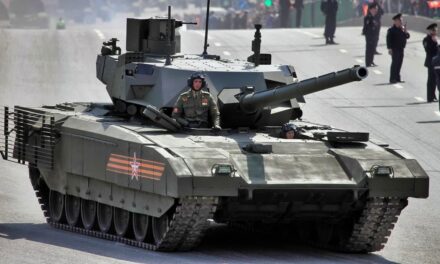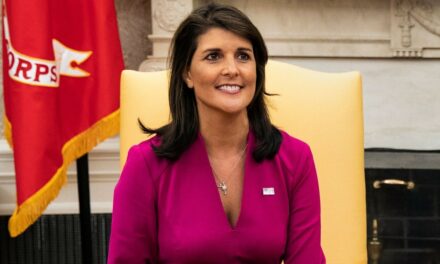We support our Publishers and Content Creators. You can view this story on their website by CLICKING HERE.
The world waits with bated breath as Hamas considers what Washington calls Israel’s “extraordinarily generous” offer to pause its fight with the genocidal terrorist group in exchange for a partial hostage release – a pause that foreign diplomats privately hope will lead to a permanent ceasefire.
Meanwhile, Washington continues to pressure Jerusalem to abandon plans to invade Rafah, Hamas’ last stronghold in Gaza, while the International Criminal Court considers issuing arrest warrants for Israeli leaders over their military response to the worst slaughter of Jews since the Holocaust.
All this, along with increasingly violent and incoherent protests against the Jewish state on college campuses across America and a largely spineless response from administrators, can make the casual observer forget that Israel’s war with Hamas began with the latter’s barbaric slaughter and hostage-taking on October 7.
As usual, Israeli leaders are caught between their responsibility to prevent a future slaughter of their people and an international community that largely blames Israel for the terror it endures and holds it to a singular (and often unrealistic) humanitarian standard when it comes to defending itself.
Those who seek peace in Gaza, however, should remember that this war is like most others: one party attacked, the other counter-attacked, and, for real and sustainable peace to take hold, both would have to opt out and move on. Pressuring Israel to make peace while demanding nothing of Hamas would do little but embolden the terrorist group to re-group, re-arm, and plan its next attack.
If peace activists really want lasting peace for both Israelis and Palestinians, here’s the least of what they should demand of Hamas:
First, renounce terror.
Lest anyone doubt Hamas’ intentions for the future, its leaders have said that their successful border-breaching and Jew-killing showed that Israel’s defeat is a “great possibility,” and that October 7 was a “scaled-down model of the final war of liberation and the disappearance of the Zionist occupation.”
And lest anyone think that Hamas cares about the 2.1 million Palestinians under its rule in Gaza, its leaders have said they will launch as many October 7-like attacks as necessary to “annihilate” Israel – and Palestinians are willing to pay the price because “we are called a nation of martyrs, and we are proud to sacrifice martyrs.”
In the meantime, Hamas continues to fire rockets into Israel, whether from its base in Gaza or from its outpost in Lebanon. Because those attacks on both military and civilian targets evoke little global outrage, Hamas has little reason to stop, prolonging a war that it launched a half-year ago.
Second, release the hostages.
The hostages that Hamas continues to hold in its dank tunnels reportedly now number 133. They witnessed the barbaricslaughter of 1,200 Israelis on October 7, and, based on the reports of those Hamas released in an earlier pause in the fighting, they continue to face both physical and sexual abuse.
The hostage deal that Hamas is considering calls for phased releases of hostages, accompanied by phased withdrawals of Israeli soldiers from parts of Gaza to facilitate humanitarian aid and enable Palestinians to return to their homes. But those who seek peace and are pressuring Israel to stop its fight now should be insisting with equal fervor that Hamas release all the hostages now.
Third, let the aid through.
“As we resume operations” in Gaza, World Central Kitchen founder Jose Andres wrote this week, referring to WCK’s pause in distributing food after an Israeli air strike killed seven of its workers, “we need to see Israeli forces step up to their responsibilities and promises to let humanitarian groups do their work.”
Fine, but if Andres wants the food to reach Palestinian civilians, he should make the same demand of Hamas. Ramzi Awda, secretary-general of the International Campaign to Combat the Occupation and Apartheid – in other words, no friend of Israel – told a TV interviewer in early April that Hamas is stealing “over 60 percent or 70 percent” of the aid and re-selling it to Palestinians “at exorbitant prices.”
When unnamed terrorists launched a mortar attack on the pier that the United States is building off Gaza’s coast to speed humanitarian aid, a high-ranking Hamas official told the Associated Press that the group would view any U.S., Israeli, or other non-Palestinian force protecting the pier as “an occupying force.”
The global push to stop the bloodshed in Gaza is understandable. But a push that solely pressures the original victim of attack (Israel) and demands nothing significant of the perpetrator (Hamas) will just embolden the latter.
The genocidal terrorists will resume their efforts to destroy the Jewish state, and they won’t hesitate to sacrifice as many innocent Palestinians as necessary along the way.
About the Author:
Lawrence J. Haas is a senior fellow at the American Foreign Policy Council and the author of, most recently, The Kennedys in the World: How Jack, Bobby, and Ted Remade America’s Empire (Potomac Books).

 Conservative
Conservative  Search
Search Trending
Trending Current News
Current News 




